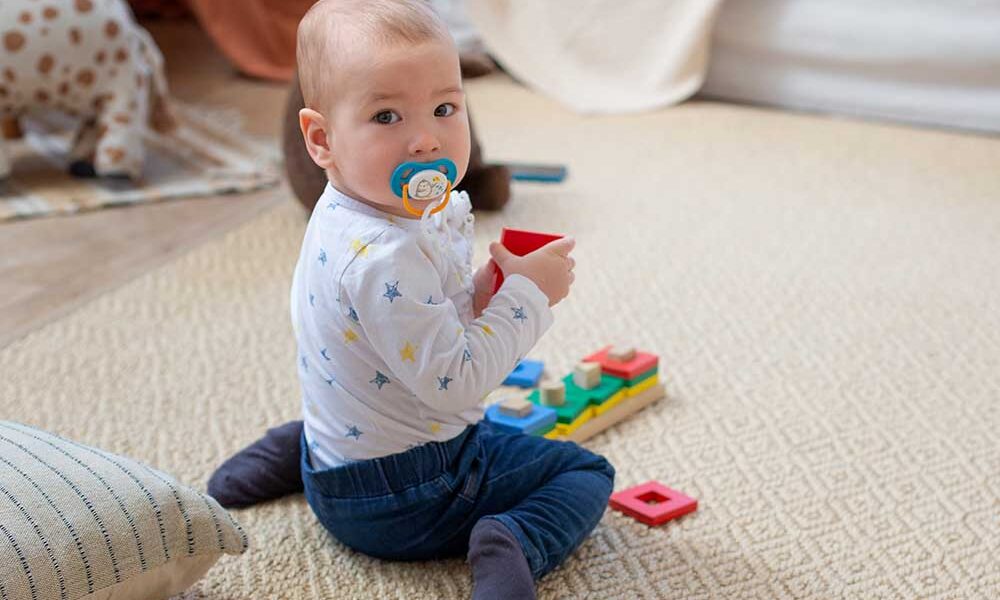Babies and pacifiers are frequently associated because pacifiers provide comfort and soothing sensations for babies. However, have you observed that your baby can’t keep the pacifier in their mouth for an extended period? In this piece, we will investigate the various causes of this problem and provide some solutions.
Why Your Baby Cant Keep Pacifier In Their Mouth
1. Pacifier Size and Shape
An ill-fitting size or shape is one of the key reasons your baby can’t keep the pacifier in their mouth. Babies’ mouths have varied features, and using a pacifier that doesn’t match their oral architecture might cause discomfort and difficulty keeping it in place.
2. Teething Issues
Teething can be a difficult stage for babies, and it can impair their use of pacifiers. When your child’s gums are sore and tender, they may reject the pacifier because of the additional pressure it puts on their gums. If your baby suddenly starts refusing the pacifier, examine teething as an explanation.
3. Absence of Interest
Babies have different preferences, and it’s possible that your child isn’t interested in using a pacifier. Some babies prefer other mouth sensations or find various ways to self-soothe. It’s critical to respect your baby’s preferences and avoid forcing them to use a pacifier if they show signs of disinterest.
4. Tongue Thrusting Reflex
Babies frequently exhibit the tongue-thrusting reflex. It’s a natural reflex that protects the airway and makes breastfeeding easier. However, because the tongue pushes the pacifier out of the mouth, this reaction can interfere with pacifier use. This response will usually fade as your baby’s oral motor abilities grow.
5. Development of Oral Motor Skills
The capacity to keep a pacifier in one’s mouth causes the development of strong oral motor skills. Babies gradually learn these skills, including the ability to suck and sustain suction, over time. So, your baby can’t keep the pacifier in their mouth consistently because they are still in the early stages of oral motor development.
Techniques for Choosing a Pacifier
To address the issue of your baby being unable to keep the pacifier in their mouth, suitable pacifier-choosing procedures must be considered. Consider the following factors:
1. Selecting the Correct Size
It is critical to choose the correct pacifier size. A pacifier that is too little or too large for your baby might be painful, making it difficult for them to hold it in their mouth. Look for pacifiers that are specifically made for your baby’s age group and consider their unique oral demands.
2. Material and Shape Consideration
Pacifiers come in a variety of materials and shapes. Certain materials, such as silicone or latex, may cause sensitivities or preferences in some babies. Experimenting with different forms, such as orthodontic or cherry-shaped pacifiers, will also assist you in finding the one that best fits your baby’s mouth.
3. Trying Out Different Brands
Every baby is different, and what works for one may not work for the next. It’s important trying out many brands of pacifiers to locate the one that works best for your kid. Some pacifiers have features that treat specific difficulties, such as encouraging tongue placement or relieving pressure on the gums.
The Importance of Pacifier Use for Babies
While it can aggravate when your baby can’t keep the pacifier in their mouth, it’s critical to understand the advantages of pacifier use. Here are some reasons pacifiers are useful:
1. Calming and Refreshing Effect
Pacifiers provide a relaxing and comfortable experience for babies. Sucking on a pacifier might help children self-soothe and relax, especially when stressed or falling asleep.
2. Encouraging Healthy Sleep
Using a pacifier before bedtime can help both newborns, and parents sleep better. It aids in the formation of a sleep association and can soothe your baby back to sleep if they wake up throughout the night.
3. Reducing the Risk of SIDS
Pacifier use during sleep has been linked to a lower risk of sudden infant death syndrome (SIDS) in studies. While the exact mechanisms are unknown, using a pacifier while sleeping appears to have a protective impact.
Mom Tips for Promoting Pacifier Use for Baby
If your baby is having difficulty keeping the pacifier in their mouth, here are some suggestions to encourage pacifier use:
1. Creating a Routine
Include the pacifier in your baby’s daily routine, such as feeding, napping, or going to bed. Your baby may develop more acclimated to the pacifier and find comfort in its presence if you establish a constant rhythm.
2. Techniques of Gentle Persuasion
Help your baby hold the pacifier in their mouth by gently guiding their hand. Gentle persuasion strategies can assist children in comprehending the purpose and benefits of the pacifier.
3. Ensure Comfort and Safety
Examine the pacifier to ensure that it is clean, unbroken, and in good condition. A damaged or dirty pacifier might cause your baby discomfort and resistance. Check for flaws and clean them regularly to ensure maximum comfort and hygiene.
4. Positive Reinforcement
When your baby successfully holds the pacifier in their mouth, praise and reward them. Positive reinforcement might encourage your infant to use the pacifier and associate it with pleasant memories.
5. Consultation with a Pediatrician
If your baby continues to struggle with retaining the pacifier in their mouth or exhibits persistent disinterest, you should see a paediatrician. They may assess your baby’s oral development, offer advice customized to his or her unique needs, and address any concerns you may have.
Wrapping Up
Finally, there may be several reasons your baby can’t keep the pacifier in their mouth. It could be related to pacifier size and form, teething issues, a lack of interest, a tongue thrust reflex, or the development of oral motor skills.
To find the ideal fit for your baby, choose the proper pacifier size, evaluate materials and forms, and experiment with different brands. Despite the difficulties, using a pacifier provides soothing and comforting effects, supports healthy sleep, and may lessen the risk of SIDS.
You may assist your infant experience the benefits of pacifier use by applying recommendations to encourage pacifier use and getting advice from a paediatrician.
FAQs About Baby and Pacifier
Is it normal if my baby can’t keep the pacifier in their mouth?
Yes, it’s normal for babies to have difficulty keeping the pacifier in their mouth, especially in the early stages. They are still developing their oral motor skills, and factors like teething or lack of interest can contribute to this issue. With time and practice, most babies improve their ability to use a pacifier effectively.
Can pacifier use affect my baby’s teeth development?
Extended and improper pacifier use can potentially impact teeth development. It’s important to choose an age-appropriate pacifier and monitor your baby’s use to prevent any adverse effects. Once your baby’s teeth start to emerge, consider gradually weaning them off the pacifier to avoid potential dental issues.
How often should I clean my baby’s pacifier?
It’s crucial to clean your baby’s pacifier regularly to maintain proper hygiene. Wash it with warm, soapy water and rinse thoroughly after each use. Avoid cleaning it with your mouth or sharing it with others, as this can introduce harmful bacteria to your baby.
Can I use a pacifier if I am breastfeeding my baby?
Yes, you can use a pacifier even if you are breastfeeding your baby. It’s generally recommended to establish a steady breastfeeding routine before introducing a pacifier, typically after a few weeks. The American Academy of Pediatrics suggests waiting until breastfeeding is well-established to avoid nipple confusion.
What should I do if my baby refuses to take a pacifier?
If your baby consistently refuses the pacifier, it’s important to respect their preferences. Some babies simply don’t find pacifiers appealing or have different self-soothing methods. Try other comforting techniques like gentle rocking, swaddling, or providing a clean finger for them to suck on. Always prioritize your baby’s comfort and well-being.
Related Posts
- My Toddler Suddenly Hates Car Seat [Why? and How to Remedy It]
- How to Manage Sibling Rivalry [Mom Guide to Promoting Harmony]
- My Toddler Suddenly Hates Grandma [Why? and How to Remedy It]
- My Toddler Hates Blankets? [How to Encourage Them to Love It]
- My Toddler Hates Wearing Clothes [Why? & What Should I do?]




Amazing blog! Do you have any suggestions for aspiring writers? I’m planning to start my own blog soon but I’m a little lost on everything. Would you propose starting with a free platform like WordPress or go for a paid option? There are so many options out there that I’m completely overwhelmed .. Any recommendations? Kudos!
Your articles are extremely helpful to me. Please provide more information!
Your articles are extremely helpful to me. Please provide more information!
The articles you write help me a lot and I like the topic